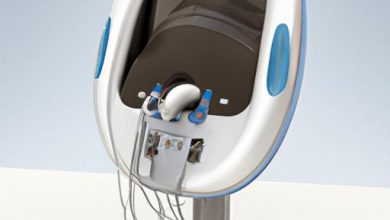10 Benefits of Artificial Intelligence in Healthcare
Artificial Intelligence has revolutionized the healthcare industry, offering innovative solutions that have transformed the way medical professionals diagnose and treat patients. With the help of AI, healthcare providers can analyze vast amounts of data, detect patterns, and make informed decisions. In this article, we will explore the ten benefits of Artificial Intelligence in healthcare and how they have transformed the industry.
Improved Diagnostic Accuracy

One of the significant benefits of Artificial Intelligence in healthcare is its ability to improve diagnostic accuracy. AI can analyze medical images and data, providing accurate diagnoses that can detect diseases at an early stage. AI-enabled medical devices have also been developed to improve the accuracy of medical procedures such as surgeries.
The accuracy of AI-enabled diagnostic tools has been proven in several studies. For instance, a study conducted by researchers at the University of California, San Francisco, found that an AI system could detect breast cancer with a 94% accuracy rate, which was higher than that of radiologists.
In addition to breast cancer detection, AI has also been used to diagnose other medical conditions such as Alzheimer’s disease, skin cancer, and heart disease. The use of AI in medical diagnosis has resulted in faster and more accurate diagnoses, which can lead to earlier treatment and increased survival rates for patients.
Personalized Treatment Plans
Another significant benefit of Artificial Intelligence in healthcare is its ability to provide personalized treatment plans for patients. AI can analyze patient data, such as medical history, genetic information, and lifestyle habits, to create personalized treatment plans that are tailored to the patient’s needs. This can lead to improved patient outcomes and reduced healthcare costs.
AI has been used to create personalized treatment plans for various medical conditions such as cancer, diabetes, and mental health disorders. For instance, AI algorithms have been used to predict the effectiveness of chemotherapy treatments for cancer patients, reducing the need for trial and error in treatment selection.
Personalized treatment plans can also help patients manage chronic conditions such as diabetes. AI-enabled devices such as continuous glucose monitors can provide patients with real-time data on their blood sugar levels, enabling them to make informed decisions about their treatment plans.
In conclusion, AI has the potential to transform the healthcare industry by improving diagnostic accuracy, providing personalized treatment plans, and reducing healthcare costs. With continued advancements in AI technology, we can expect even more innovative solutions that will improve the quality of healthcare and patient outcomes.
Personalized Treatment Plans
AI can analyze patient data and create personalized treatment plans that are tailored to the patient’s specific needs. This is possible because AI has the ability to learn from past patient data and use that information to predict future outcomes and identify the best course of treatment.
One example of AI-assisted treatment plans is the use of virtual assistants to help patients manage their chronic conditions. These virtual assistants can provide personalized coaching and reminders to patients, helping them stick to their treatment plans and improve their health outcomes.
Another example is the use of AI in cancer treatment. AI can analyze a patient’s genetic information and recommend targeted therapies that are more effective than traditional treatments. This can lead to better patient outcomes and reduced healthcare costs.
Predictive Analytics
AI has the ability to identify patterns and predict health outcomes, making it a valuable tool for predictive analytics in healthcare. By analyzing large amounts of data, AI can identify risk factors for various medical conditions and predict the likelihood of future health events.
For example, AI has been used to predict the onset of sepsis in hospitalized patients. By analyzing vital signs, laboratory results, and other patient data, AI algorithms can identify patients who are at risk of developing sepsis before symptoms appear. Early intervention can then be initiated, leading to better patient outcomes.
AI has also been used to predict hospital readmissions. By analyzing patient data, such as medical history and socio-economic factors, AI algorithms can identify patients who are at high risk of being readmitted to the hospital after being discharged. This can enable healthcare providers to implement preventative measures, such as follow-up care and support services, to reduce the likelihood of readmission.
In conclusion, AI’s ability to provide personalized treatment plans and predictive analytics has transformed the healthcare industry. With continued advancements in AI technology, we can expect even more innovative solutions that will improve patient outcomes and reduce healthcare costs. As a result, the future of healthcare looks promising with the integration of AI technology.
Enhanced Patient Experience
Another benefit of Artificial Intelligence in healthcare is its ability to enhance the patient experience. AI can improve patient engagement and communication, leading to better health outcomes. Patients can use AI-enabled devices to monitor their health and communicate with healthcare providers, making healthcare more accessible and convenient.
AI chatbots are being used to improve patient communication by providing patients with information on their medical conditions, treatment plans, and medications. Chatbots can also help patients schedule appointments and remind them to take their medications, improving patient adherence to treatment plans.
AI can also improve patient experience in hospitals by reducing wait times and improving the efficiency of medical procedures. AI-enabled robots can perform routine tasks such as taking vital signs and delivering medications, freeing up healthcare providers to focus on more complex tasks.
Cost Savings
Artificial Intelligence can also significantly reduce healthcare costs. AI-enabled devices can automate routine tasks, reducing the need for human labor, and improving efficiency. This can lead to cost savings for healthcare providers and patients.
One area where AI has been particularly effective in reducing costs is in medical imaging. AI can analyze medical images and detect abnormalities, reducing the need for human interpretation. This can lead to faster diagnoses and reduced healthcare costs.
AI can also reduce healthcare costs by improving patient outcomes. With personalized treatment plans and improved diagnostic accuracy, patients can receive the most effective treatments for their medical conditions, reducing the need for costly and ineffective treatments.
In conclusion, Artificial Intelligence has the potential to transform the healthcare industry by enhancing the patient experience and reducing healthcare costs. While there are challenges to implementing AI in healthcare, such as data privacy and security concerns, the benefits are significant and cannot be ignored. At Zahnweiss Info, we are dedicated to providing the latest updates on healthcare technology and empowering our readers to live their healthiest lives.




